Women self-censor.
Think about all the non-pregnant women of childbearing age that you know. A quarter of them are probably menstruating right now. So what? Is that statistical fact even a big deal?
Yeah. Kinda. I think so. You’re sat here reading these words on a screen because a woman once had a functioning menstrual cycle many years ago. The thing is, for something that’s so common and abundant and ordinary (PERIODS), we don’t see or hear much about it. Which is quite odd and antiquated if you think about it. I mean, how does society benefit to be so shielded* from our menses? Or for that fact, from our lactating breasts or our miscarriages or our ‘women’s troubles’, etc etc?
(*I don’t mean literally. I don’t want anyone to have a tampon thrown at them, thanks.)
This little essay is a personal response to the comics of Julie Doucet, which, since I first encountered them in my early twenties, served to rock my world. They forced me to question the kind of comics I wanted to make, my attitudes towards the female experience on and off the page, towards biology, sex and shame. All that stuff factored in my response to Julie Doucet’s comics. Plus they look and read great. They still hold this timeless, glorious power for me. I’m so freaking glad she made the comics she did! Let us take a look!
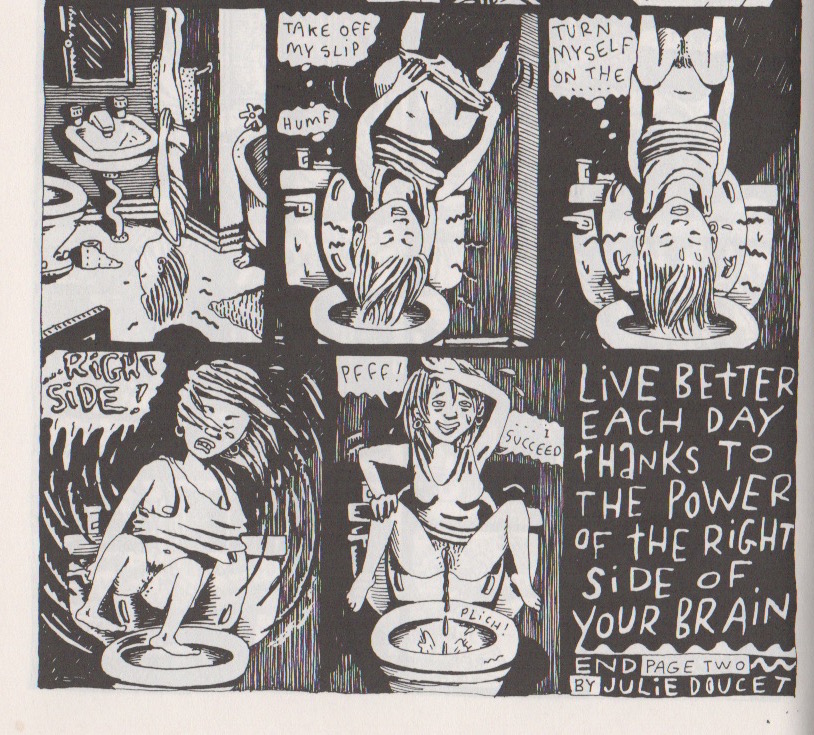
I love these panels from Doucet’s Leve ta Jame, Mon Poisson Est Mort (pictured above). So serious and elegant, the details of the bathroom perfectly rendered, that toilet paper! (Julie draws the toilet quite a lot in her comics. Deal with it). Look at the little sweattels on her beatific forehead. This is about using imagination and humor to dealing with a familiar, tiresome fact of life (tampon overfull in the night). The ‘I succeed’ makes me chuckle, the gush of blood is not so terrifying, is it? It’s rendered in black ink after all. It’s cute even.
Well it got me thinking, this comic does present an unusual sight, does it not? A relieved woman, legs akimbo bleeding it to the toilet bowl from her levitating hover. Where are all the other women getting their periods in comics, or on screen? Sure, there’s Stephen King’s Carrie. She once had her period. I also seem to remember Brook Adams rummaging for a Tampax in Gas, Food Lodgings in 1992. Well so what about literature? Uterine bleeding was never fully acknowledged by the literary establishment until 1957 when Anna Wulf famously forgot her tampons in the novel The Golden Notebook, which ultimately won Doris Lessing a Nobel Prize, so groundbreaking was this depiction. Doris described the smells, stained sheets, the nebulous grotty feeling, the worry of accidentally bleeding through her dress in front of her male colleagues.
The Golden Notebook unleashed a free-for-all spurting of literary menstrual blood from Sylvia Plath all the way to Philip Roth (hey, Roth, want to really shock? Lovingly whip a tampon out of your female protagonist. She probably won’t mind). Those creators recognized some latent dark power when they needed it. It’s a useful taboo, creatively. It speaks to those dark fears and misunderstood feminine powers right?
And then there’s Julie, baring all with a shrug and a grin. God, how I love comics….
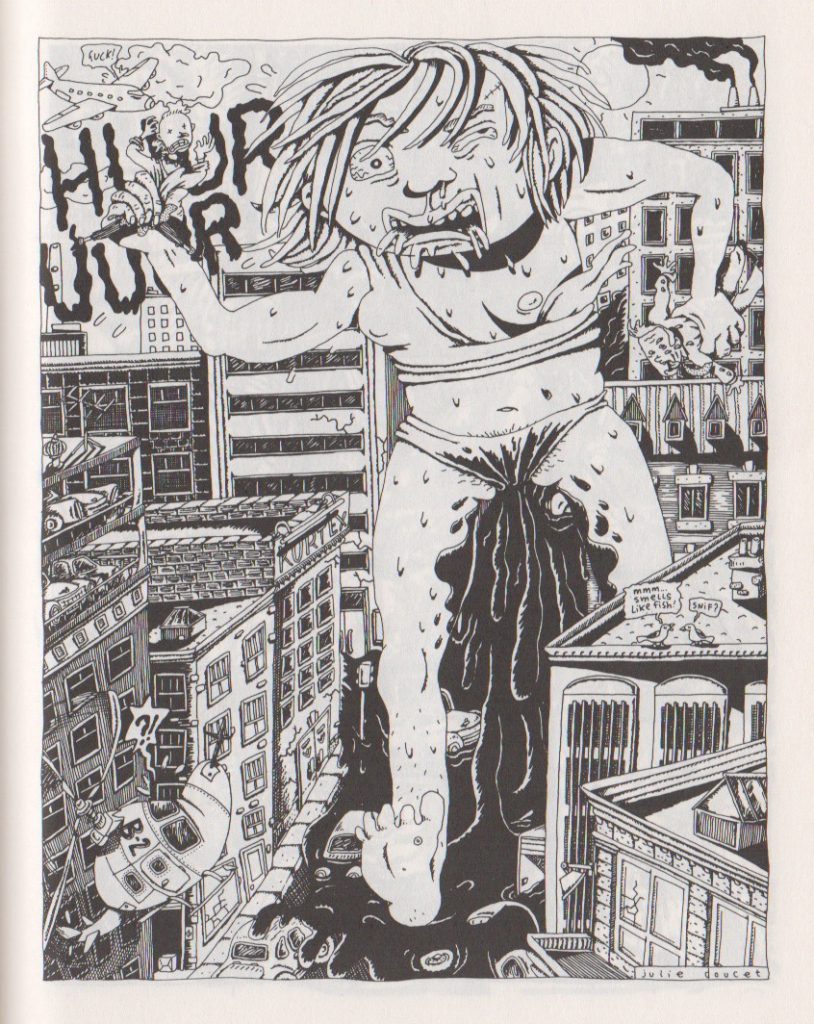
When I was in high school a girl from another grade bled through her skirt and obliviously walked through the teenage crowd. A female teacher came up behind her with her sweater outstretched, tied it around the unsuspecting girl’s waist and hustled her away. There it was the biggest fear in all my years of high school in plain sight. I saw it! It happened to that girl I saw, it can happen to you too, teenage female! Never relax, never let down your guard! And…OH JULIE, you can’t do that! You can’t grow to King Kong proportions and drown the streets in your inky period blood whilst on the rampage for a box of Tampax. You just can’t do that!
This page (above) is the equivalent of a teenage air punch and I wished I owned the original. I would put it on the wall in my dining room in a heartbeat.
The comic strip ends on sweet note. I don’t feel like the menstruating women of the world ask for all that much. Tax-free sanitary products and a little understanding would be a start though.
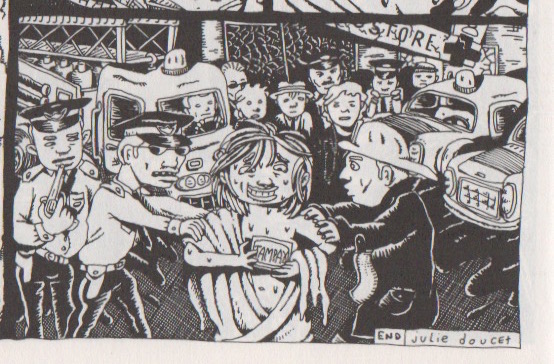
In Jedi terms our menstrual cycles can be understood to have two aspects, the waxing of the full moon, the ‘light’ and wonderful powers of the fertile period and the dank, smelly and scary shadow world of the menses. The ‘Dark’ side. This is known to us, albeit unconsciously.
“Researchers at the University of Mexico…concluded that the financial reward for being a topless-lap dancer are far greater during the fertile part of the menstrual cycle with dancers earning nearly twice as much a peak ovulation time.”1
The same pattern played out with waitresses at truck-stop café diners, researchers discovered. Waitresses found their tips peaked during ovulation (the pleasant part) and waned as the cycle moved towards menstruation (ew gross!). In other words, according to Earth Feminist writer, Uma Dinsmore-Tuli:
“Our culture has a clear message to us: that we are rewarded for ovulating and devalued for menstruating…that menstruation is worthless to men and thus should be disregarded and rendered invisible.”2
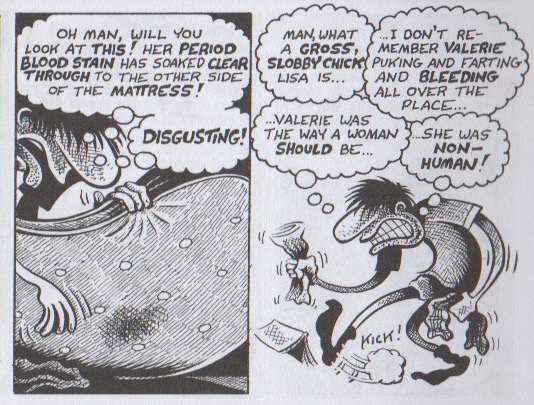
Julie Doucet’s comics don’t ‘render invisible’ this aspect of her biology but nor is she just letting it all hang out. She renders the female existence (and female-as-artist) experience in a relatable, funny, transformative way. Sex, masturbation, miscarriage, dreams of pregnancy are not held as taboos. Taboos can harm us, repress us, and shame us. And for what? To be stiffed on tips when you get your period (read: men know anyway). Why are we hiding all this bleeding?)
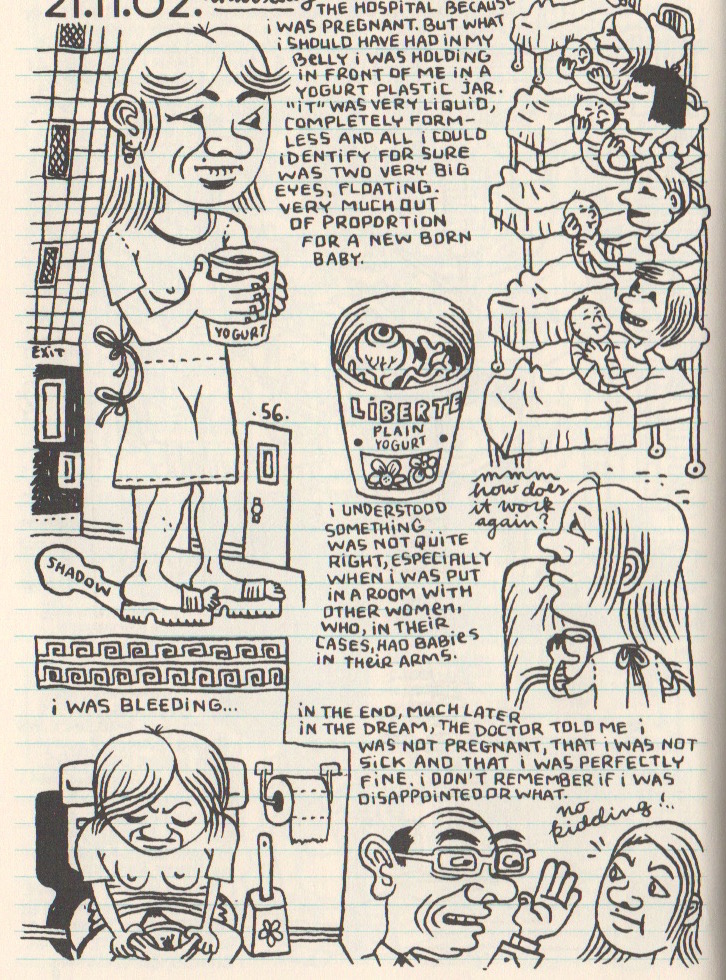
This page (above) from Julie is a dream comic from her 2007 book 365 Days. It’s personal to her so I’m not going to attempt to interpret it – but I do want to point out that it’s full of imagery familiar to many women. Here she dreams of a liquefied baby in a yogurt cup called ‘Liberte’, a line of women with their successfully acquired babies, and getting your period yet again. These are familiar symbols for any woman who’s given thought to pregnancy, either wanting or not wanting it. Or both. It’s perfectly simple, complex, elegant, dashed off – it’s the absolute mastery Doucet has with pen and paper that makes difficult things look easy. And she writes with a clarity and honesty about themes with are common to many women, specifically perhaps, to women who want to create things and not just babies.
Here’s a fetus and a fashion model!
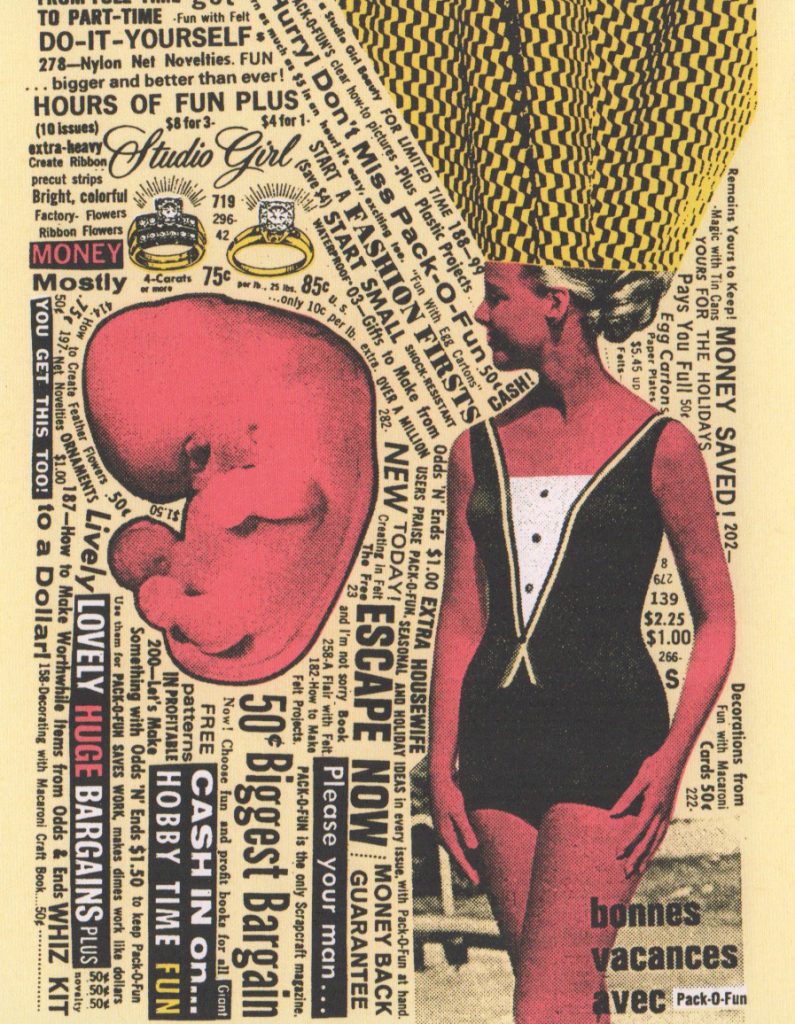
I mean, woah! She takes bullshit women’s magazines and turns them into something transcendentally awesome.
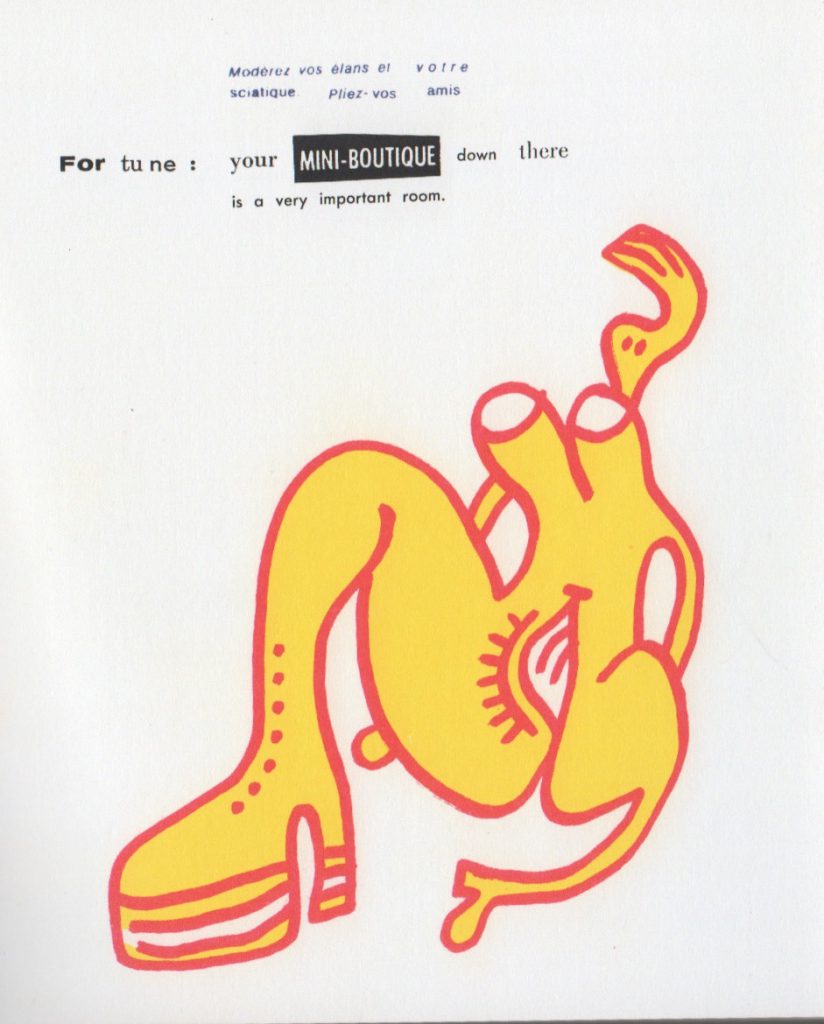
And this (above). It’s so funny, pretty, ironic. And smart. We the ladies, are the expansive force of the universe, are we not?
Women’s lives contain many interconnected cycles. And we overlap – put us in a house together and our menstruation will become synchronous. We’ll bleed together, more or less. And things have changed, generationally. I’m personally having more periods than my grandmother who birthed and nursed six babies ever did. All this bleeding is the new normal, at least in the Western world, for now. All this latent creative female energy and we’re so embarrassed about it? We should own our cyclic power. That’s what I get from Julie Doucet’s comics.
She connects to her inner forces, laughing and with a self-assured shrug, over many, many accomplished pages.
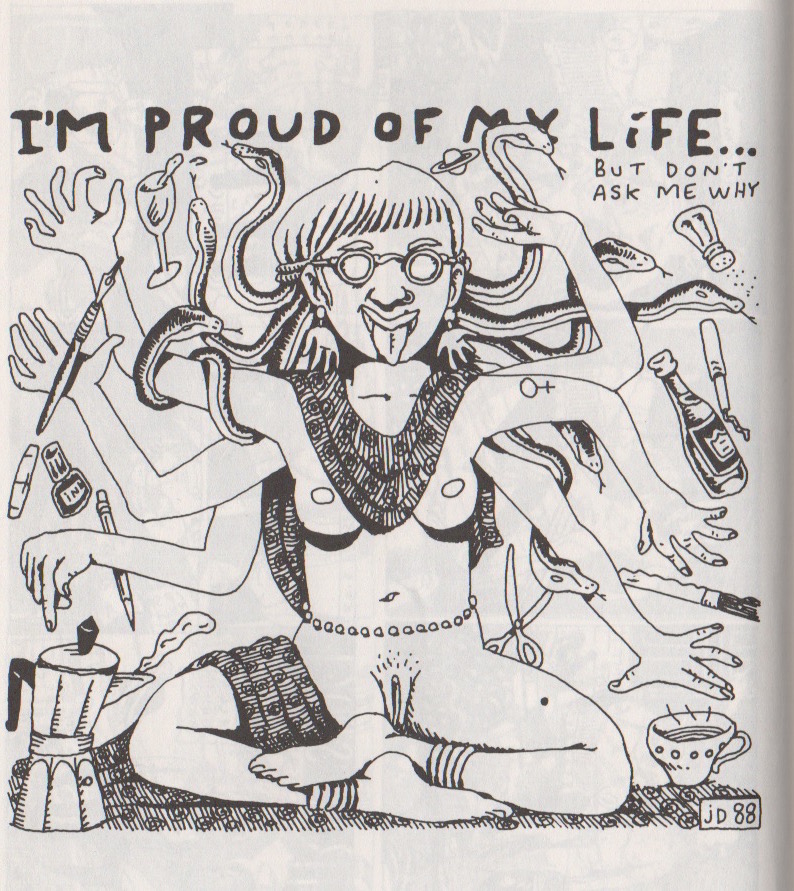
1 Hallinan, Joseph T, 2009 Errornomics: Why We Make Mistakes and How We Can Avoid Them, p.47
2 Dinsmore-Tulli, Uma, 2014 Yoni Shakti: A Woman’s Guide to Power and Freedom Through Yoga and Tantra, p.259
—————————————————————————————————
Sacha Mardou is a Brit making comics in St Louis, Missouri. Sky in Stereo is her most recent comic.